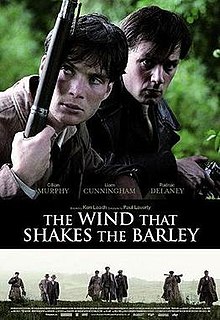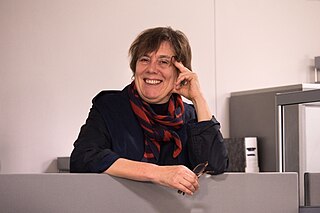
Cathy Come Home is a 1966 BBC television play about homelessness. It was written by Jeremy Sandford, produced by Tony Garnett and directed by Ken Loach. A 1998 Radio Times readers' poll voted it the "best single television drama" and a 2000 industry poll rated it as the second-best British television programme ever made. Filmed in a gritty, realistic drama documentary style, it was first broadcast on 16 November 1966 on BBC1. The play was shown in the BBC's The Wednesday Play anthology strand, which often tackled social issues.

Kes is a 1969 British kitchen sink drama film directed by Ken Loach and produced by Tony Garnett, based on the 1968 novel A Kestrel for a Knave, written by the Hoyland Nether–born author Barry Hines. Kes follows the story of Billy, who comes from a dysfunctional working-class family and is a no-hoper at school, but discovers his own private means of fulfillment when he adopts a fledgling kestrel and proceeds to train it in the art of falconry.

Land and Freedom is a 1995 film directed by Ken Loach and written by Jim Allen. The film narrates the story of David Carr, an unemployed worker and member of the Communist Party of Great Britain, who decides to fight in the Spanish Civil War for the republicans, a coalition of Socialists, Communists and Anarchists against a nationalist coup d'etat. The film won the FIPRESCI International Critics Prize and the Prize of the Ecumenical Jury at the 1995 Cannes Film Festival. The film was also nominated for the Palme d'Or at Cannes.
Melvin Barry Hines, FRSL was an English author, playwright and screenwriter. His novels and screenplays explore the political and economic struggles of working-class Northern England, particularly in his native West Riding/South Yorkshire.

Poor Cow is a 1967 British kitchen sink drama film directed by Ken Loach and based on Nell Dunn's 1967 novel of the same name. It was Ken Loach's first feature film, after a series of TV productions. Set in London, the Winstanley and York Road Estates in Battersea were amongst the locations featured prominently in the background. The film was re-released in the UK in 2016.
Looks and Smiles is a 1981 British drama film directed by Ken Loach. It is based on the novel of the same name, written by Barry Hines. The film was entered into the 1981 Cannes Film Festival, where Loach won the Young Cinema Award.

The Wind That Shakes the Barley is a 2006 war drama film directed by Ken Loach, set during the Irish War of Independence (1919–1921) and the Irish Civil War (1922–1923). Written by long-time Loach collaborator Paul Laverty, this drama tells the fictional story of two County Cork brothers, Damien O'Donovan and Teddy O'Donovan, who join the Irish Republican Army to fight for Irish independence from the United Kingdom.
Tony Garnett was a British film and television producer, and actor. Best known for his thirteen-year association with director Ken Loach, his work as a producer continued into the 21st century.
Barry Ackroyd, BSC is an English cinematographer. Ackroyd has frequently worked with directors Ken Loach and Paul Greengrass. He worked on Kathryn Bigelow's 2008 war film The Hurt Locker as well as the critically acclaimed 2013 biographical thriller Captain Phillips, the former earning him a BAFTA Award and an Academy Award nomination for Best Cinematography. In 2014, Ackroyd became the president of the British Society of Cinematographers.
Robert "Rob" Dawber was a British railwayman turned writer whose script for the film The Navigators was commissioned by director Ken Loach and shot in Sheffield, where Dawber lived. He was a long-standing member of the Trotskyist group the Alliance for Workers' Liberty.

Looking for Eric is a 2009 British-French film about the escape from the trials of modern life that football and its heroes can bring for its fans. It was written by screenwriter Paul Laverty and directed by the English director Ken Loach. The film's cast includes the former professional footballer Eric Cantona and Steve Evets, former bass guitarist with The Fall.
The Gamekeeper is a 1980 British drama film directed by Ken Loach. It is based on a novel of the same name by Barry Hines. It competed in the Un Certain Regard section at the 1980 Cannes Film Festival. As with Barry Hines's other scripts, most of the dialogue is in Yorkshire dialect.
Anthony Hayward is a British journalist and author. He is a regular contributor to The Guardian, The Daily Telegraph and The Independent, and has written more than 20 books about television and film. The subjects of justice and censorship have been constant themes throughout his work. "Hayward is particularly good on conflicts with authority," wrote one critic reviewing his biography Which Side Are You On? Ken Loach and His Films.
Fatherland is the nation of one's "fathers", "forefathers" or "patriarchs".
The Spirit of '45 is a 2013 documentary film by British director Ken Loach, focused on and celebrating the radical changes in post-war Britain under the Labour government of Clement Attlee, which came to power in 1945. Relying primarily on archive footage and interviews, and without a narrative voiceover, the film recounts the endemic poverty in prewar Britain, the sense of optimism that followed victory in World War II and the subsequent expansion of the welfare state, founding of the National Health Service and nationalisation of significant parts of the UK's economy. The film documents the extent to which these achievements, as Loach sees them, have since been subject to attack in the decades that followed, particularly under the Conservative governments of Margaret Thatcher in the 1980s. Loach said that the model for the film was "oral history, with pictures".

The Big Flame is a 1969 BBC television play by socialist playwright Jim Allen, produced by Tony Garnett and directed by Ken Loach. The play tells the story of 10,000 dockworkers occupying the Liverpool docks in a "work-in". Filmed in a gritty, realistic drama documentary style, it was first broadcast on 19 February 1969 on BBC1, at a time when unemployment was rising in Britain. The play was shown in the BBC's The Wednesday Play anthology strand, which was noted for tackling social issues.

Kenneth Charles Loach is a British film director and screenwriter. His socially critical directing style and socialist ideals are evident in his film treatment of social issues such as poverty, homelessness, and labour rights.

I, Daniel Blake is a 2016 drama film written by Paul Laverty and directed by Ken Loach. It stars Dave Johns as Daniel Blake, a middle-aged man who is denied Employment and Support Allowance despite being declared unfit to work by his doctor. Hayley Squires co-stars as Katie, a struggling single mother whom Daniel befriends.

Rebecca O'Brien is a BAFTA-winning film producer, known especially for her work with Ken Loach. O'Brien was born in London, England.

Sorry We Missed You is a 2019 drama film written by Paul Laverty and directed by Ken Loach.











